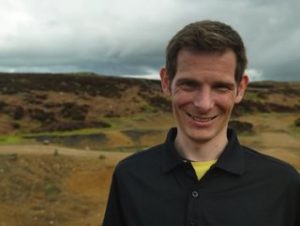 But the care-free life we were just starting to enjoy wasn’t to last, and in a devastating turn of fortunes we were faced with a choice that no one should have to consider; life or death. For many years I had suffered from bowel problems, like many people with similar symptoms, I was misdiagnosed as having irritable bowel syndrome (IBS). When my condition deteriorated whilst in Australia, I sought medical advice and was sent for further tests. The results were conclusive, I had pseudomyxoma peritonei (PMP). My only option was to return home to the UK and to start a course of treatment at the Christie cancer hospital in Manchester. We were having the time of our lives, literally making friends, going out and partying, working hard and playing hard. There was never any doubt that moving to Australia was the right thing for us and we were going to make the most of it. The diagnosis came out of nowhere. I just collapsed. You never know how you will react, you don’t plan for it and it’s not something you expect to happen. It’s the old cliché – it’s never going to happen to me. Our lives were put on pause but we had no idea at this point just what lay ahead. On returning to the UK, I was immediately admitted into the Christie and preparations were made for me to have an operation in the hope that the surgeons could remove as much of the tumour as possible. The cytoreductive surgery would be coupled with HIPEC, which involves washing the tumour in hot chemotherapy.
But the care-free life we were just starting to enjoy wasn’t to last, and in a devastating turn of fortunes we were faced with a choice that no one should have to consider; life or death. For many years I had suffered from bowel problems, like many people with similar symptoms, I was misdiagnosed as having irritable bowel syndrome (IBS). When my condition deteriorated whilst in Australia, I sought medical advice and was sent for further tests. The results were conclusive, I had pseudomyxoma peritonei (PMP). My only option was to return home to the UK and to start a course of treatment at the Christie cancer hospital in Manchester. We were having the time of our lives, literally making friends, going out and partying, working hard and playing hard. There was never any doubt that moving to Australia was the right thing for us and we were going to make the most of it. The diagnosis came out of nowhere. I just collapsed. You never know how you will react, you don’t plan for it and it’s not something you expect to happen. It’s the old cliché – it’s never going to happen to me. Our lives were put on pause but we had no idea at this point just what lay ahead. On returning to the UK, I was immediately admitted into the Christie and preparations were made for me to have an operation in the hope that the surgeons could remove as much of the tumour as possible. The cytoreductive surgery would be coupled with HIPEC, which involves washing the tumour in hot chemotherapy. 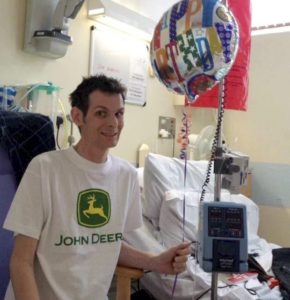 Knowing my operation should take up to 18 hours when I came round in the recovery suite and realised it was only two hours later, I knew there was a problem and it was unlikely the news was going to be positive. I knew as soon as I came round. It couldn’t possibly have been an 18-hour procedure and the faces on those around me told me all I needed to know. The surgeons explained the operation was too dangerous and as a result, there was nothing more they could do. Just a month earlier, I was looking forward to a life at the other side of the world, I was now told that I had up to two years to live. I was only 35 years old. I was put on palliative care and embarked on a process that revolved around hospital visits, medication and the slow degeneration of my strength, basic abilities and quality of life. Despite wanting to make the most of the time that I had left, I found it increasingly difficult to accept the hand that I’d been dealt. I’m not known for my patience, and I have a very fiery temper so to be told that I was going to die and there was nothing I could do about it wasn’t sitting well with me. I turned to the internet and started to do some research. It was a long-shot, but there had to be something more that could be done. I had 6 months of chemo but the disease had worsened I began to get very sick very quickly and was in and out of hospital with bowel obstructions. After looking around on the internet myself and taking advice from the team at Pseudomyxoma Survivor, I contacted the team at Basingstoke to get their opinion. I then got very sick and was back in hospital. This time it was serious and my consultant told me there was nothing he could do and I only had weeks to live. He told me I needed to say my goodbyes and think about letting go. Now I’m a Yorkshire lad with a beautiful girl by my side and everything to live for so I said “No way!”. I asked him to call Basingstoke and see what they said. They told me to get down there as soon as possible so in an epic six-hour journey, I went by ambulance down to Basingstoke. I met Brendan Moran who was the gentlest kind man I ever met and I broke down in tears meeting him. I knew if anyone can fix me he could, I was sent for scans. The news wasn’t good and Mr Moran explained that surgery to remove the tumours would be too risky and would do more damage, in turn reducing my life expectancy. Crushed is the only word I can use to describe that moment. It was the end of the line. I’d done all I could and it wasn’t enough. I just didn’t know what to think. My fight was over. He then asked me if I had heard of former England and St Helens Rugby League player, Steve Prescott, who also had PMP. “Of course,” I replied “Steve was my inspiration. I was floored when he died”. Mr Moran then told me how Steve had undergone a pioneering surgery at Churchill Hospital in Oxford. The operation was complicated and a world first ever to be performed; it required the removal of Steve’s tumours followed by a multi-organ transplant. The 32-hour operation was a success, however, Steve sadly lost his battle three-weeks-later as a result of graft-versus-host-disease, a complication that can occur following transplants. As devastating as the news of Steve’s death had been, I took strength from his attitude and determination towards his diagnosis of PMP. I had and still do have a huge respect for Steve, I couldn’t let this legacy that he had started stop before it had begun. I decided there and then that this was an opportunity for me.
Knowing my operation should take up to 18 hours when I came round in the recovery suite and realised it was only two hours later, I knew there was a problem and it was unlikely the news was going to be positive. I knew as soon as I came round. It couldn’t possibly have been an 18-hour procedure and the faces on those around me told me all I needed to know. The surgeons explained the operation was too dangerous and as a result, there was nothing more they could do. Just a month earlier, I was looking forward to a life at the other side of the world, I was now told that I had up to two years to live. I was only 35 years old. I was put on palliative care and embarked on a process that revolved around hospital visits, medication and the slow degeneration of my strength, basic abilities and quality of life. Despite wanting to make the most of the time that I had left, I found it increasingly difficult to accept the hand that I’d been dealt. I’m not known for my patience, and I have a very fiery temper so to be told that I was going to die and there was nothing I could do about it wasn’t sitting well with me. I turned to the internet and started to do some research. It was a long-shot, but there had to be something more that could be done. I had 6 months of chemo but the disease had worsened I began to get very sick very quickly and was in and out of hospital with bowel obstructions. After looking around on the internet myself and taking advice from the team at Pseudomyxoma Survivor, I contacted the team at Basingstoke to get their opinion. I then got very sick and was back in hospital. This time it was serious and my consultant told me there was nothing he could do and I only had weeks to live. He told me I needed to say my goodbyes and think about letting go. Now I’m a Yorkshire lad with a beautiful girl by my side and everything to live for so I said “No way!”. I asked him to call Basingstoke and see what they said. They told me to get down there as soon as possible so in an epic six-hour journey, I went by ambulance down to Basingstoke. I met Brendan Moran who was the gentlest kind man I ever met and I broke down in tears meeting him. I knew if anyone can fix me he could, I was sent for scans. The news wasn’t good and Mr Moran explained that surgery to remove the tumours would be too risky and would do more damage, in turn reducing my life expectancy. Crushed is the only word I can use to describe that moment. It was the end of the line. I’d done all I could and it wasn’t enough. I just didn’t know what to think. My fight was over. He then asked me if I had heard of former England and St Helens Rugby League player, Steve Prescott, who also had PMP. “Of course,” I replied “Steve was my inspiration. I was floored when he died”. Mr Moran then told me how Steve had undergone a pioneering surgery at Churchill Hospital in Oxford. The operation was complicated and a world first ever to be performed; it required the removal of Steve’s tumours followed by a multi-organ transplant. The 32-hour operation was a success, however, Steve sadly lost his battle three-weeks-later as a result of graft-versus-host-disease, a complication that can occur following transplants. As devastating as the news of Steve’s death had been, I took strength from his attitude and determination towards his diagnosis of PMP. I had and still do have a huge respect for Steve, I couldn’t let this legacy that he had started stop before it had begun. I decided there and then that this was an opportunity for me. 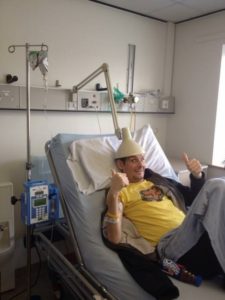 Without hesitation, I asked to be put forward. I made it clear that I was aware of the risks and the complications and also of the fact that there were no current examples of people surviving this procedure. If this was to work, I would be a world first. By this time, my health was rapidly deteriorating. I was fed through a tube that had to be administered by my girlfriend, Laura, I was on 24-hour care, required hourly medication and had lost so much weight I couldn’t get myself out of the bath. It was no life. I was dying; my girlfriend could see it; my friends could see it and I was very aware of how little time I had left. This was my last chance and it was a risk but it had to work. There was no other option. In order for me to undergo any surgical procedure, I had to put on weight and to exercise. As someone who was just 55kg, this was my first major challenge. Putting on weight was just impossible. I was fed through a tube and was so tired all of the time. I called upon everything I had left – and I mean everything – to get me to where I needed to be. It was so hard and I have to admit some days I just wasn’t sure that I was strong enough but I would look at Laura and think, there has to be a future. I have to get through this. I was referred to the team in Oxford and put on TPN to keep me alive. The team said they could help but time was running out. I underwent a week of tests to see if I could cope with such massive surgery. On a return visit to Oxford, I was told to go home and to pack a bag, I was finally strong enough to be considered for the operation. They told me that I would be called if a donor was found and I would have to get from Wensleydale to Oxford in just five hours. Less than 48 hours later, at 2 am, I got the call they had a donor and to get down there as soon as possible. We grabbed what we could and made the agonising trip to Oxford. This was easily the most difficult journey I have ever made. I was in excruciating pain and despite my medication, my body was shutting down. This long in a car for anyone is uncomfortable but for me, it was nothing short of a nightmare. While we drove to Oxford the organs from the donor were tested and found to be a match. Preparations were made so that I could be admitted as soon as I arrived. Laura and I had just 30 minutes while the final preparations took place. It was surreal. We were here and there was some hope – but I was terrified. I looked at Laura and she looked at me, we didn’t need any words. Instead, we chose some new slippers on the iPad and then it was time. Saying goodbye to Laura at that point was the hardest thing I’ve ever done in my life. The 17-hour operation, required 30 people working shifts and resulted in the removal of a 10kg tumour and my stomach, large bowel, small bowel, gallbladder, pancreas, appendix, spleen and my abdominal wall. I was then transplanted with multiple abdominal organs. Remaining in an induced coma for several days, doctors were surprised with my progress and after several days it was officially announced that the procedure had been a success. I would remain in Remaining in an induced coma for several days, doctors were surprised with my progress and after several days it was officially announced that the procedure had been a success. I would remain in hospital for several months and although my recovery was painful one thing was abundantly clear, I was alive. No one should ever have to go through this – it’s not what I expected of my life but I cannot thank the surgeons and Mr Moran enough. I came round after surgery and I knew that I still had a way to go but I was here. It was the start of a different chapter and one that focused on survival, not on death. I had a few issues with graft vs host and a few other problems and to be honest there were many days I wish I’d never done it. But after a lot of hard work I got through it, I spent 14 weeks in hospital in total. Over the next year, I was readmitted to hospital but with Laura’s support – she was by my side throughout – I became stronger and started to enjoy a more ‘normal’ life. Simple things like enjoying food again or going for a long walk were just brilliant. I was still tired and probably shouldn’t push myself as much as I do but I have my life back. We celebrated my first anniversary recently – it was a year since my surgery. Looking at pictures you just wouldn’t believe how far I’ve come.
Without hesitation, I asked to be put forward. I made it clear that I was aware of the risks and the complications and also of the fact that there were no current examples of people surviving this procedure. If this was to work, I would be a world first. By this time, my health was rapidly deteriorating. I was fed through a tube that had to be administered by my girlfriend, Laura, I was on 24-hour care, required hourly medication and had lost so much weight I couldn’t get myself out of the bath. It was no life. I was dying; my girlfriend could see it; my friends could see it and I was very aware of how little time I had left. This was my last chance and it was a risk but it had to work. There was no other option. In order for me to undergo any surgical procedure, I had to put on weight and to exercise. As someone who was just 55kg, this was my first major challenge. Putting on weight was just impossible. I was fed through a tube and was so tired all of the time. I called upon everything I had left – and I mean everything – to get me to where I needed to be. It was so hard and I have to admit some days I just wasn’t sure that I was strong enough but I would look at Laura and think, there has to be a future. I have to get through this. I was referred to the team in Oxford and put on TPN to keep me alive. The team said they could help but time was running out. I underwent a week of tests to see if I could cope with such massive surgery. On a return visit to Oxford, I was told to go home and to pack a bag, I was finally strong enough to be considered for the operation. They told me that I would be called if a donor was found and I would have to get from Wensleydale to Oxford in just five hours. Less than 48 hours later, at 2 am, I got the call they had a donor and to get down there as soon as possible. We grabbed what we could and made the agonising trip to Oxford. This was easily the most difficult journey I have ever made. I was in excruciating pain and despite my medication, my body was shutting down. This long in a car for anyone is uncomfortable but for me, it was nothing short of a nightmare. While we drove to Oxford the organs from the donor were tested and found to be a match. Preparations were made so that I could be admitted as soon as I arrived. Laura and I had just 30 minutes while the final preparations took place. It was surreal. We were here and there was some hope – but I was terrified. I looked at Laura and she looked at me, we didn’t need any words. Instead, we chose some new slippers on the iPad and then it was time. Saying goodbye to Laura at that point was the hardest thing I’ve ever done in my life. The 17-hour operation, required 30 people working shifts and resulted in the removal of a 10kg tumour and my stomach, large bowel, small bowel, gallbladder, pancreas, appendix, spleen and my abdominal wall. I was then transplanted with multiple abdominal organs. Remaining in an induced coma for several days, doctors were surprised with my progress and after several days it was officially announced that the procedure had been a success. I would remain in Remaining in an induced coma for several days, doctors were surprised with my progress and after several days it was officially announced that the procedure had been a success. I would remain in hospital for several months and although my recovery was painful one thing was abundantly clear, I was alive. No one should ever have to go through this – it’s not what I expected of my life but I cannot thank the surgeons and Mr Moran enough. I came round after surgery and I knew that I still had a way to go but I was here. It was the start of a different chapter and one that focused on survival, not on death. I had a few issues with graft vs host and a few other problems and to be honest there were many days I wish I’d never done it. But after a lot of hard work I got through it, I spent 14 weeks in hospital in total. Over the next year, I was readmitted to hospital but with Laura’s support – she was by my side throughout – I became stronger and started to enjoy a more ‘normal’ life. Simple things like enjoying food again or going for a long walk were just brilliant. I was still tired and probably shouldn’t push myself as much as I do but I have my life back. We celebrated my first anniversary recently – it was a year since my surgery. Looking at pictures you just wouldn’t believe how far I’ve come. 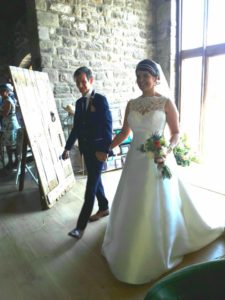 I really cannot thank the medical team enough. They believed in me and they took a risk – a big risk – but it has paid off. I also want to thank the donor family. The harsh reality is that someone has to lose their life for someone else to live and I will never forget that or take it for granted. I will appreciate that for as long as I live. Following our next big adventure, which was our wedding this summer, we will be taking on the Mongol Rally, believed to be the ‘greatest motoring adventure on the planet’. The challenge will see us travel unassisted – in a 15-year old Suzuki Jimny – across 15,000 miles, covering 24 different countries and difficult terrain to Mongolia then up into Russia as far as we can before the road runs out. Then we’ll donate everything to a local charity, hop on a plane and fly home. It will take 10 weeks, all unassisted. When it breaks, I have to fix it.
I really cannot thank the medical team enough. They believed in me and they took a risk – a big risk – but it has paid off. I also want to thank the donor family. The harsh reality is that someone has to lose their life for someone else to live and I will never forget that or take it for granted. I will appreciate that for as long as I live. Following our next big adventure, which was our wedding this summer, we will be taking on the Mongol Rally, believed to be the ‘greatest motoring adventure on the planet’. The challenge will see us travel unassisted – in a 15-year old Suzuki Jimny – across 15,000 miles, covering 24 different countries and difficult terrain to Mongolia then up into Russia as far as we can before the road runs out. Then we’ll donate everything to a local charity, hop on a plane and fly home. It will take 10 weeks, all unassisted. When it breaks, I have to fix it. 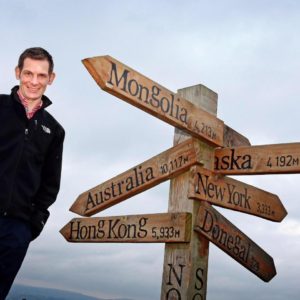 As someone who has no patience, the Mongol Rally will be a test of mental and physical strength, endurance and teamwork. Some of my friends have said that we are bonkers for even considering it but I look at things differently – I’ve been given a second chance and I’m going to make every moment count. I wore my Pseudomyxoma Survivor t-shirt with pride in hospital along with my wristband which I never take off. The Mongol Rally is my opportunity to give something back and I hope that as well as giving us an experience we can remember forever it will allow us to raise the profile of PMP, the fantastic work by Mr Moran and the surgeons at Oxford and most importantly the belief that you should never give up. – Adam
As someone who has no patience, the Mongol Rally will be a test of mental and physical strength, endurance and teamwork. Some of my friends have said that we are bonkers for even considering it but I look at things differently – I’ve been given a second chance and I’m going to make every moment count. I wore my Pseudomyxoma Survivor t-shirt with pride in hospital along with my wristband which I never take off. The Mongol Rally is my opportunity to give something back and I hope that as well as giving us an experience we can remember forever it will allow us to raise the profile of PMP, the fantastic work by Mr Moran and the surgeons at Oxford and most importantly the belief that you should never give up. – AdamIn case you missed it...
My stomach looked really distended
When we got home from a family holiday and I looked at the photos, my stomach looked really distended. After noticing this, it just seemed to get worse and felt quite hard. I went to see the Doctor and he said I probably had wind or had just put on weight.
I was shocked by my pseudomyxoma peritonei diagnosis
Being diagnosed with pseudomyxoma peritonei (or PMP) came as a huge shock. It was discovered accidentally as my usual yearly bloods showed abnormalities.
My belly size surprised the doctor more than my hernia
He asked if I drank a lot, thinking it was a liver problem causing accumulation of fluid in the abdomen. He requested an ultrasound, which revealed the presence of intense ascites. There seemed no other abnormalities.
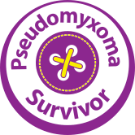
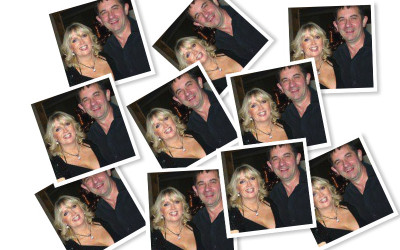
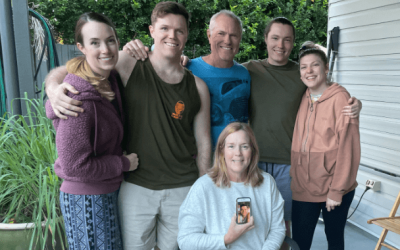
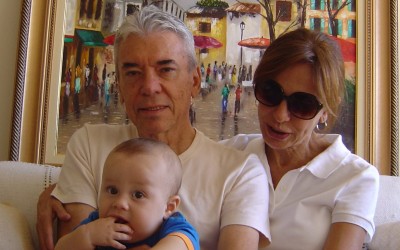
Hi Adam
I have just been refused surgery at Manchester for PMP. I would love to talk to you. Please would you email me as I’m desperate. Thanks in advance
Russ